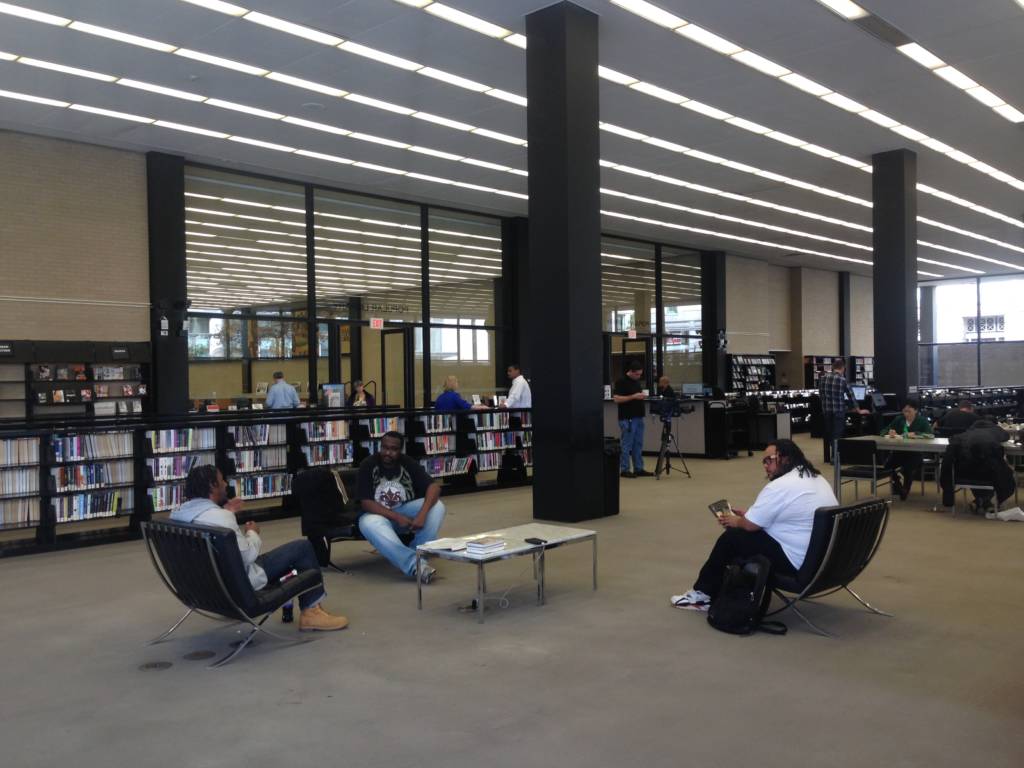Public Libraries have historically been places where people can access information and be educated. Patrons can browse and check out books, read in lounge areas and access the Internet. These community resources have also become one of the most common providers of daytime services for people experiencing homelessness.
An individual can escape harsh weather conditions outside and, for a few hours, experience the warmth and welcome of a sheltered area.
Jean Badalamenti, a social worker with 20 years’ experience, was hired as the first Health and Human Services Coordinator for the D.C. Public Library system just over one year ago. Her job is to support people who use libraries to access services that will help them get back on their feet.
“I think people were always connecting with different opportunities here at the library that we offer, whether it is being on the computer and connecting with family and friends on Facebook or job seeking,” said Badalamenti. “These things were always here.”
By creating Badalamenti’s position, D.C. Public Libraries became the second library system in the country to embrace this role as a haven for the local homeless community. She oversees the entire public library system in the District and is tasked with brainstorming and coordinating the services to offer the libraries’ most vulnerable patrons
Two of the main initiatives Badalamenti has focused on are partnering with human services organizations and training staff to be able to serve homeless customers.
“I think there are just more opportunities to get services,” said Badalamenti.
Through her previous position with Miriam’s Kitchen, Badalamenti got to know the patchwork network of nonprofits and government agencies that make up the city’s safety net. District libraries now partner with Pathways to Housing DC, Neighborhood Legal Services Program (NSLP), and U.S. Vets.
Rachel Preloh, a University of Maryland Grad student who interns with Pathways to Housing DC, goes to Martin Luther King Jr. Library for 20 hours each week to connect with people who need referrals and housing assessments.
“I have some office hours and people can come check in if they’re interested in services,” Preloh said. “But I also spend a lot of time circulating, checking in with people, getting to know people by asking how their day is going and just being a friendly face for them.”
It is important for Preloh to be consistent and not give up on her clients. Pathways believes that building relationships through face-to-face interactions and daily rapport is the way to reach people.
“We are persistent, in a very compassionate way,” said Hannah Zollman, a spokesperson for Pathways to Housing DC. “It’s about walking around, being that presence.”
Preloh described a particular client that she saw during every visit to MLK library. Preloh introduced herself and explained the services that Pathways provides, but the woman was not interested.
“She felt like she had been through other services or had traumatic experiences before, so she was very skeptical, I think,” Preloh said. “When we hear that, as outreach workers we still believe that there is a chance to build a rapport.”
Preloh did not give up and she checked in with the woman on a regular basis, the woman mentioned that she had lost her ID and started to express interest in getting her birth certificate, connecting with legal services and seeking employment.
“Part of the reason that we formed this partnership with MLK library was because there was that group of individuals who weren’t being served because they were inside during the day,” Zollman said. “Our goal is not just to manage homelessness, it is to end homelessness.”
Attorneys from NLSP also hold office hours at several libraries in the system. NLSP provides free legal services to low-income individuals who reside in the District.
“We focus our limited resources on those problems that low-income folks have that are most destabilizing, most difficult for them to overcome without them having an advocate and which present the biggest barriers to their ability to get on a pathway out of poverty,” said Hannah Lieberman, Executive Director of NLSP.
These issues include high-conflict family law, child support, income support and housing problems such as preventing illegal evictions or addressing substandard conditions, according to Lieberman.
“It is always challenging to reach certain groups of people to let them know that our services are available,” said Heather Hodges, Pro Bono Counsel at NLSP. “One of the reasons why we have a partnership with the library is because they have 26 locations across the city and a lot of people come to those branches everyday just to get information about a range of things.”
Many people don’t understand that some of the problems they are experiencing have underpinnings that could be potentially overcome with the help of a lawyer, according to Lieberman.
Like Rachel Preloh’s work at MLK library with Pathways to Housin DC, it is important for each organization that offers services to people in the library to be a constant friendly face. It is a proven method to build trust and understand what each individual needs.
“That is such a critical part of the philosophy of a public library, that we are in fact a place that welcomes everyone,” Badalamenti said.








